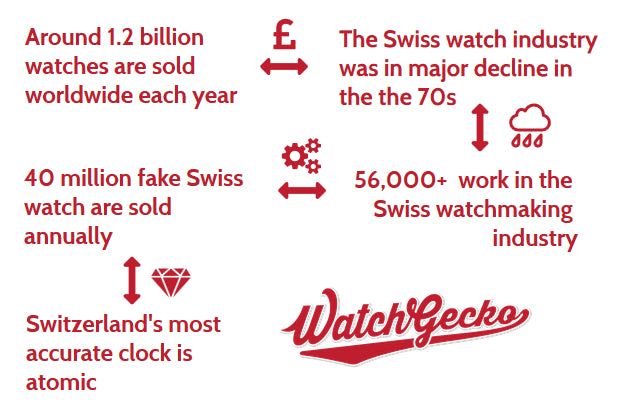Facts about the Swiss watch industry

So you've heard of the Swiss watch industry? Here's some interesting facts about them.
Disaster?
Although Switzerland are known to make high quality and highly desired watches, you wouldn't have expected that only 40 years ago (in the 1970s) the Swiss watch industry was in major decline. But they fought back, and continually grow each year (although, the recession of 2008 did slow down export levels).
But at the start of 2011 the luxury goods market increased, and so did Swiss made watches. Some estimates suggest that around 1.2 billion watches are made each year. That's not just in Switzerland though, it includes other countries like China.
Swiss Made
The Swiss have one unique thing that other countries do not have, that is their 'made in Switzerland' allure. The term 'Swiss Made' is of course held in the highest regard, and for this reason the brand is protected. For a watchmaker to stamp 'Swiss Made' on their watches, it has to have at least 60% manufactured Swiss parts and made in Switzerland.
Fake Swiss watches
A surprising 40 million fake Swiss labelled watches are sold every year, according to Swissworld. To fight this the “Fake Watches for Fake People” campaign was launched by the Federation of the Swiss Watch Industry & Haute Horlogerie. They say to “Be authentic. Buy real.” You can't get more authentic than the famous Patek Philippe 1932 Henry Graves JR. Supercomplication pocket watch. It went to auction at Sothebys, selling for just over £15 million in November 2014. The bidder set a new record for the highest ever purchased watch.
Craftsmen and women
Of course the creation of these high end watches means that over 56,000+ highly skilled people are employed (in 2012) in the watch making industry in Switzerland. They're employed by top Swiss watch brands like the Swatch Group, Rolex, LVMH and smaller family run businesses.
Mechanical or electronic?
Whilst the material watches are made out of seem to be shifting in trend, in 2013 the most popular products (pdf) were made from steel and other metals like platinum. So it's not surprising to hear that the type and style of wristwatches are changing too.
Mechanical watches are the most popular with it holding an estimated 77% of the market.
But recently a newer demand for electrical 'wearable technology' e.g. the 'smartwatch' has emerged. Did you know the electronic watch can be traced back to 1957? The first electric watch was produced by the Hamilton Watch Company. Later the Swiss watch industry developed an even more accurate Quartz movement wristwatch in 1967.

Atomic clocks
Switzerland's most accurate clock is not actually mechanical or electric, it's atomic. It's reported that if you checked the time in 30 million years it would still be in time within a single second. Atomic clocks work by measuring energy particles (and despite their name they aren't radioactive!).
Swiss future?
The future of the Swiss watch industry looks bright, and as the value of the Swiss franc increased in January (2015), the industry's prices have too. Meaning Swiss watches have become even more valuable.





